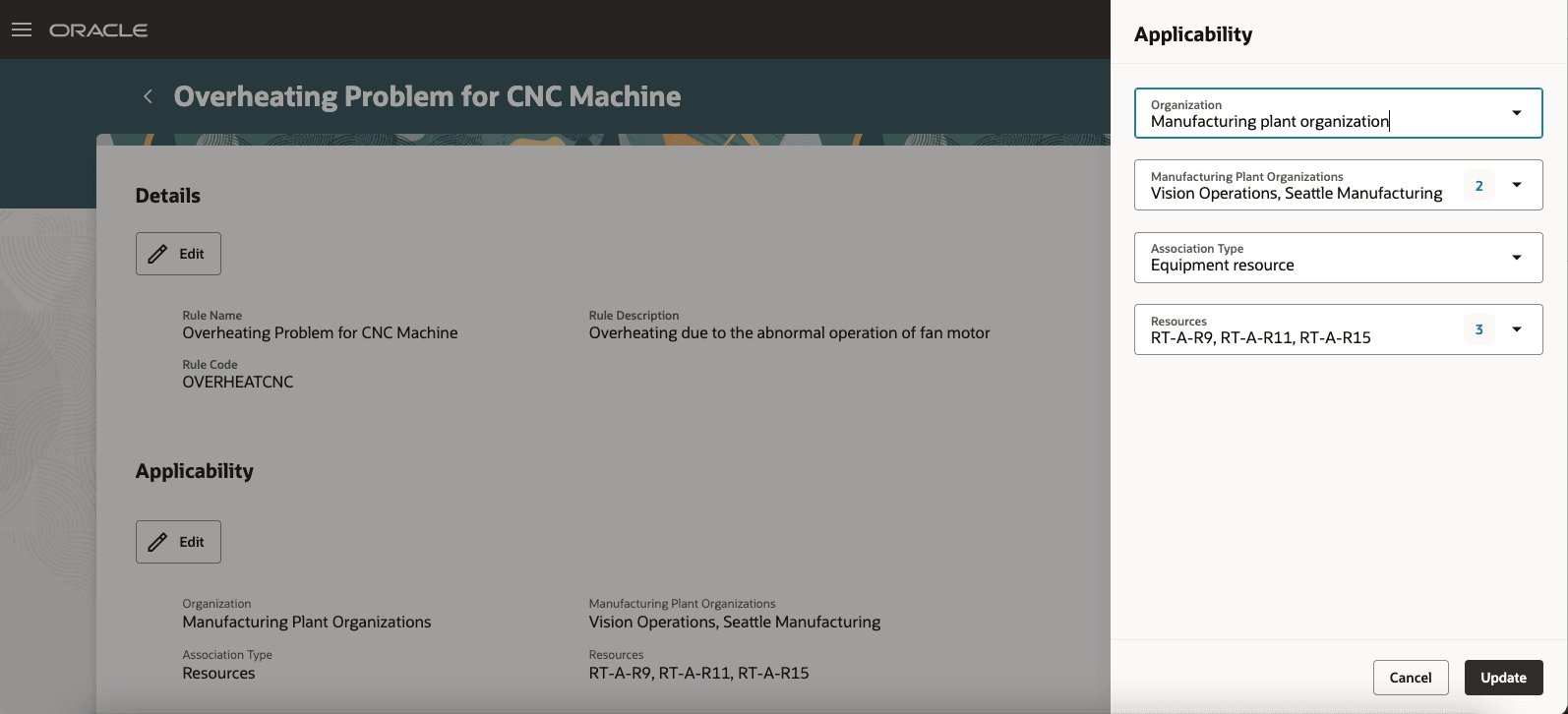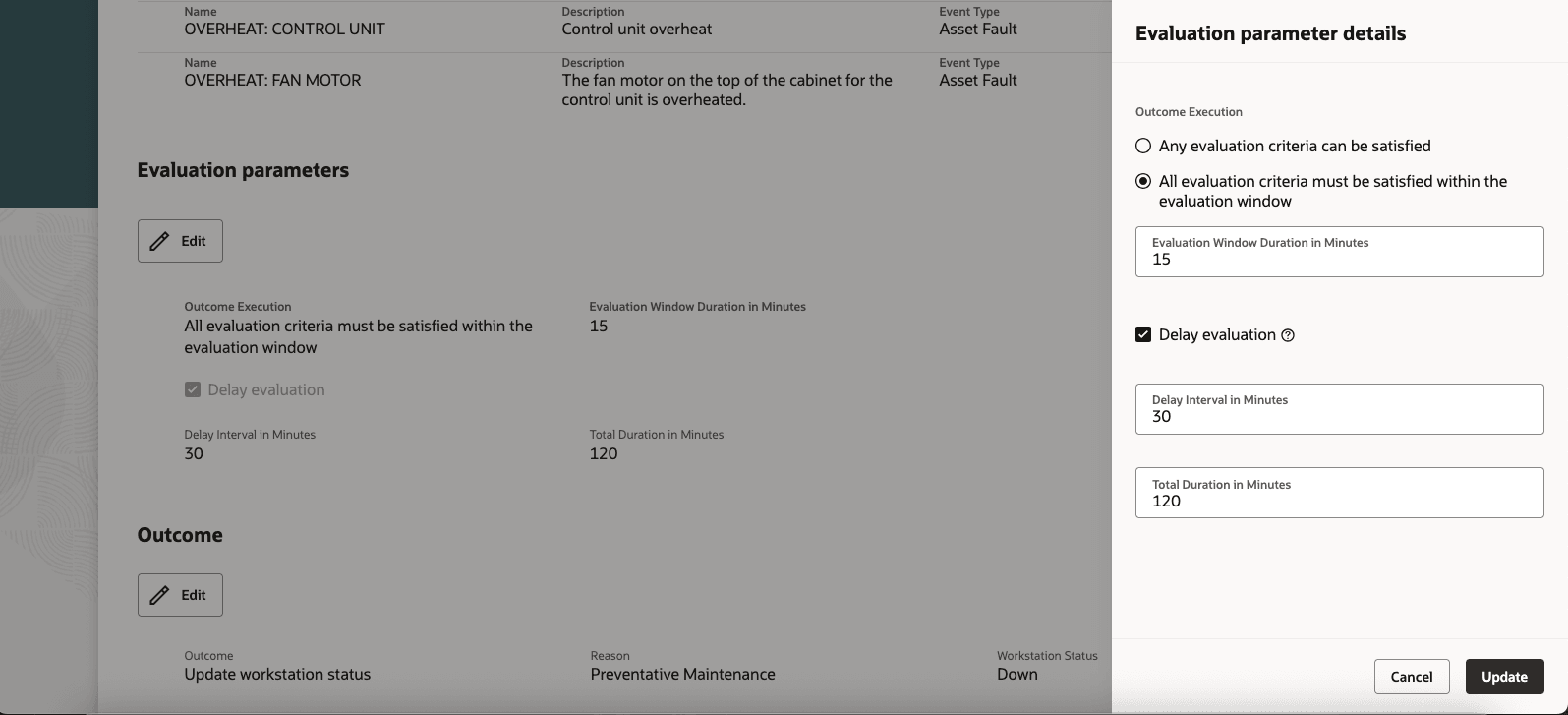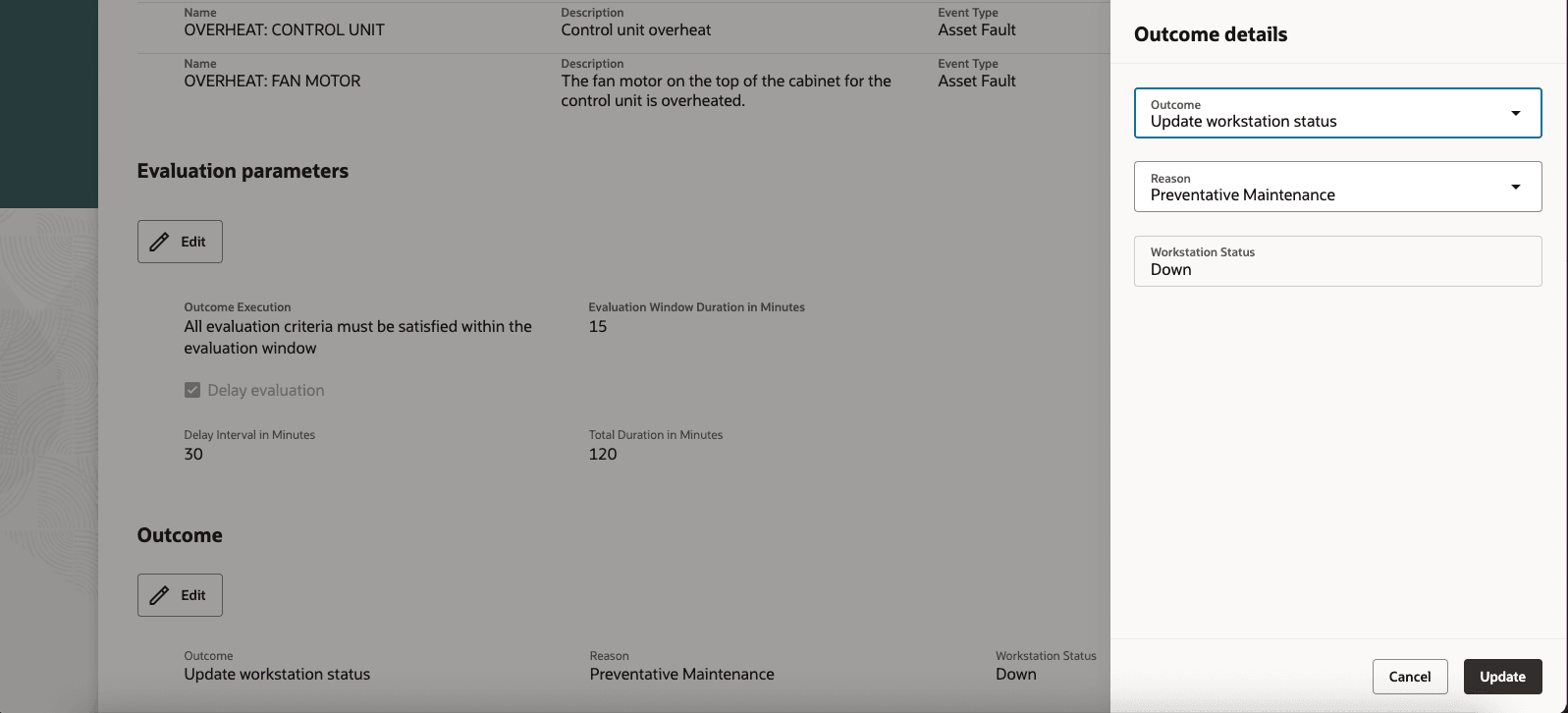Update Workstation Statuses Automatically Using Operational Rules
Connected equipment used for execution during manufacturing send out events or signals which are used to determine change of state of equipment or a failure signal. Adding execution context to the information received from connected equipment may be needed to take the appropriate action. You can now use these signals to automatically update the workstation status along with a reason code.
With this update, you can use operational rules to set workstation statuses along with reason codes in the rule outcome. You can also apply the rule to specific organizations and resources. For example, you may want the workstation status to change to 'Down' if a critical equipment fails at the workstation. When setting the applicability for a rule, select one or more location or operating organizations. Based on the organization type you select, you can select the association types, such as the items, item categories, resources, or resource instances (assets) to which the rule applies. When there are multiple connected equipment (resource instances) present at a workstation, the workstation status can be automatically set by invoking the operational rule during execution. However, the workstation status is only impacted by the resource instance linked to the ongoing operation.

Select Applicability for Organizations and Resources

Optionally Configure Delay Evaluation

Select Outcome as Update Workstation Status
Manufacturers can effectively respond to data received from connected equipment. They have the latest information on workstation statuses and equipment maintenance requirements on the shop floor.
Here's the demo of these capabilities:
Steps to Enable
To enable this feature you need to log a Service Request (SR).
- Select Product Module - Oracle Fusion Manufacturing Cloud Service.
- Select Category - Work Execution.
- Select Subcategory - Manage Work Orders.
- Select Component: Installation Issue (INSTALL).
- Copy and paste this text into description area of the SR: Enable the SCM Core Service-Smart Operations.
This feature requires the SCM Core Service-Smart Operations service to be provisioned on your instance. Please note that this service can be enabled only on pods that are available on Oracle Public Cloud regions. Once this service is enabled, you can access the user guide and implementation guide to learn more about this feature and how to set it up.
Tips And Considerations
- You can configure operational rules from Work Definition > Operational Rules.
- Production supervisors can configure workstation status change reasons and the corresponding workstation statuses under the Smart Operations Configurations task in the Work Execution work area.
- The following status change reasons are predefined in the application: Setup, Corrective Maintenance, Shift Break, and Break.
- You can set up the rules to evaluate incoming events and also consider receipt of the same event twice in a specified time window to drive the outcome.
- You can select upto 10 applicable Organizations and upto 25 applicable Association Types.
- Attributes of events of type Asset Fault, Asset Status and Operational Parameters can be used as inputs for the evaluation criteria.
- If the evaluation criteria includes multiple conditions, then to achieve the AND operator result, you can set Evaluation Parameter Details to "All evaluation criteria must be satisfied within the evaluation window". This lets you set a time window within which all conditions should be met for the outcome actions to be triggered.
- To suppress the initial occurrence of events, you can enable “Delay Evaluation” to ignore the first instance of the configured criteria.
- This also lets you provide values for the “Delay Interval” and “Total Duration” parameters.
- If a rule triggers an outcome and updates the workstation's status to Down during execution, the work order operation execution is stopped, and the workstation becomes unavailable for work execution until the status changes to idle. When the work execution stops, the work order operation resource transactions are also reported.
- Equipment instance signals received via industrial communication protocols need to be converted to a REST payload that Fusion Manufacturing Cloud can ingest and take actions on. The accepted payload specifications are documented here: REST API for Oracle Fusion Cloud SCM.
Key Resources
- Watch the feature demo for Update Workstation Statuses Automatically Using Operational Rules.
- Oracle Fusion Cloud SCM: Refer to the Using Manufacturing guide, available on the Oracle Help Center.
- Oracle Fusion Cloud SCM: Refer to the Implementing Manufacturing and Supply Chain Materials Management guide, available on the Oracle Help Center.
Access Requirements
Users who are assigned a configured job role that contains the following duty roles and privileges can use this feature:
- Manage Operational Rules and Events (ORA_DR_SMO_MANAGE_OPERATIONAL_RULES_AND_EVENTS_MFG_DUTY) duty role, can be accessed from the Roles and Permission Groups option within Security Console
- Manage Operational Rules (SMO_MANAGE_OPERATIONAL_RULES_PRIV)
- Access HCM Common Components (HRC_ACCESS_HCM_COMMON_COMPONENTS_PRIV)
- Manage HCM Rules (HRC_MANAGE_HCM_RULES_PRIV)
Guided Journeys : Role Codes
- Use REST Service - Guided Journeys Read Only (Role Code ORA_PER_REST_SERVICE_ACCESS_GUIDED_JOURNEYS_RO)
- Use REST Service - Guided Journey Responses (Role Code ORA_PER_REST_SERVICE_ACCESS_GUIDED_JOURNEY_RESPONSES)